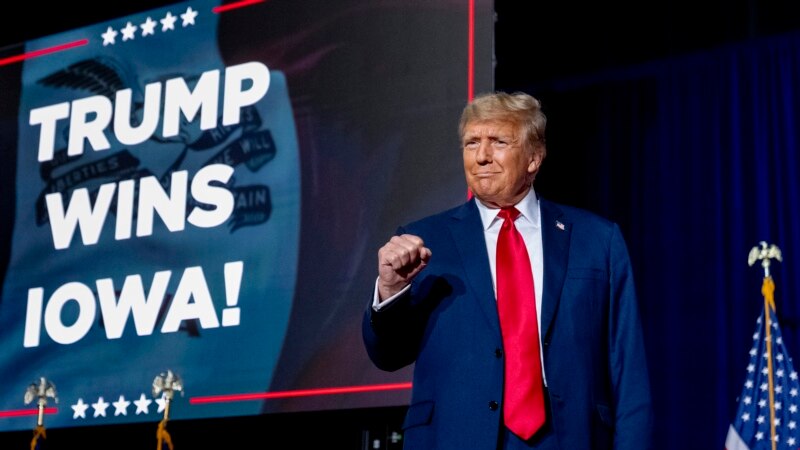
Former U.S. President Donald Trump won the Iowa caucuses Monday night, capturing the first of the state-by-state nominating contests the Republican Party will use to choose its candidate to face off against President Joe Biden in the November general election.
Trump secured more than half the votes, about 51%, with Florida Governor Ron DeSantis placing second with 21% and former South Carolina Governor Nikki Haley closely behind at 19%.
“This has been an incredible experience,” Trump told his supporters in a victory speech in Des Moines. “And they said, well, if you win by 12%, that’s a big win. That’s going to be very hard to do. Well, I think we’ve more than doubled that.”
The figure that candidates will be watching throughout the nominating process is the number of delegates they amass, with the votes in each state determining how many delegates are allocated to each candidate in their quest to earn the 1,215 needed to win a majority.
Iowa for its importance as the first contest on the calendar is relatively minor in terms of delegates, with Trump earning 20 for his win, while DeSantis got eight and Haley seven.
The top three candidates projected confidence after Monday’s caucuses as they looked toward the next contest in New Hampshire next week and the South Carolina primary in late February.
Haley cast herself as a “new generation of conservative leadership” as she spoke to her supporters, while positioning Monday’s results and the upcoming primary calendar as narrowing the race to one between her and the front-runner Trump.
“When you look at how well we’re doing in New Hampshire, in South Carolina and beyond, I can safely say tonight Iowa made this Republican primary a two-person race,” Haley said.
DeSantis described his candidacy as representing “hope for this country’s future” as he thanked supporters for backing him despite what he saw as an “everyone against us” campaign in Iowa.
“We have got a lot of work to do, but I can tell you this, as the next president of the United States I am going to get the job done for this country,” DeSantis said.
Early voting states have called a halt to presidential bids by candidates who do not place well, and Monday’s caucuses brought the end of biotech entrepreneur Vivek Ramaswamy’s campaign.
After placing fourth with 7.7% of the vote, Ramaswamy announced he was suspending his campaign for president and endorsing Trump in the race.
Even before the Iowa vote, a lack of support spelled the end to several other Republican campaigns, including those of Trump’s vice president, Mike Pence, former New Jersey Governor Chris Christie and South Carolina Senator Tim Scott.
While the race has narrowed, Republicans will not officially name their presidential candidate until their party convention in July, while Democrats are expected to name Biden as their candidate at an August convention.
In the end, most polling and political analysts predict another contest between two aging politicians, Trump, 77, and Biden, 81. It would be a replay of the contentious 2020 election when Biden thwarted Trump’s reelection bid.
Trump is facing an unprecedented 91 criminal charges across four indictments and trials. Some of the cases could occur in the coming months, including one in Washington set for March 4 accusing him of illegally trying to upend his 2020 election loss. But the criminal charges played little role in the lead-up to the Iowa vote.
Both Haley and DeSantis have shied from consistent, vocal political attacks on Trump for fear of alienating his supporters, although they assailed his refusal to attend the five debates held so far where they could confront him directly.
They have chided him for an increasing national debt during his White House tenure and his failure to build the wall along the U.S.-Mexico border that he promised in his successful 2016 campaign to curb migrants from crossing.
Some information for this report came from The Associated Press and Reuters.
